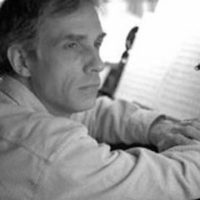John Howell Morrison (b. 1956) is a native of rural North Carolina. He began his study of music with piano at age 9, but gained his most influential experiences playing the trumpet. As a high school student attending the Governor’s School of North Carolina in instrumental music, John played entirely music of the twentieth century, laying the foundation for a life as a composer.
Undergraduate musical studies were at Davidson College. It was only after college that John began to study composition, and he eventually completed a master of music in composition at the University of Tennessee. His principle teachers there were John Anthony Lennon, Kenneth Jacobs and Allen Johnson. Doctoral studies at the University of Michigan were funded by the university’s most prestigious award, the Regents Fellowship. Teachers at Michigan included William Bolcom, William Albright, Nicholas Thorne, George Wilson, and Leslie Bassett. John served as a teaching fellow during that time, and his degree was completed with the aid of a Predoctoral Fellowship. Teaching posts have followed, at Tennessee State University, Luther College, Case Western Reserve University, Cleveland State University, the Cleveland Institute of Music, and Oberlin College. John has served on the board of directors of the Iowa Composers Forum, and was elected president of the Cleveland Composers Guild. Now residing in Medford, Massachusetts, John teaches composition and theory at the Longy School of Music in Cambridge.
Morrison has composed for a wide range of ensembles, solo instruments and chorus. He has been commissioned by New Gallery Concert Series, Firebird Ensemble, Dinosaur Annex, the Radnofsky Quartet, Intergalactic Contemporary Ensemble (ICE), the Pittsburgh New Music Ensemble, the Nashville Chamber Orchestra, the Detroit Chamber Winds, Antiqua Nova, the Galhano/Montgomery Duo, Davidson College, the Cleveland Composers Guild, Longy School of Music, and several individual performers. Grants from the Fromm Foundation, the Ohio Arts Council (2002 Individual Artist Fellowship), American Composers Forum (Composers Commissioning Project and Performance Incentive Fund), Meet the Composer, Iowa Arts Council, Luther College, and the American Music Center (Margaret Fairbank-Jory Copying Assistance) have supported his work. John has been awarded residencies at the MacDowell Colony, I-Park Artists’ Enclave, the Schweitzer Institute (Festival at Sandpoint), June in Buffalo and the Charles Ives Center for American Music.
John’s music has been performed throughout the U.S., including significant exposure on the 1999 U.S. tour by ICE, which featured stops in New York and Los Angeles, among others. Other highlights include performances by the Pacifica Quartet, Firebird Ensemble, San Francisco Contemporary Music Players, at two annual conferences of the North American Saxophone Alliance, national conferences of the Society for Electro-Acoustic Music in the U.S. and the Society of Composers, Inc., and of course by all the commissioning ensembles already mentioned.
In addition to the recently released Innova Recording #584, John’s music appears on compact disc on Arizona University Recordings #3098 and Ten Thousand Lakes SC 114. His music is available from Arizona University Publications and M. Baker Publications.
Teaching Philosophy
As a teacher, John is most interested in helping students to develop penetrating musical minds which can deal with any musical problem that comes along. Equipping students to solve their own problems through rigorous inquiry combined with a solid, flexible command of music fundamentals serves that aim. In recent years, John has become deeply interested in contemplative approaches in the classroom, and is developing a holistic theory of music known as the Sound Energy Aggregate. Two graduate-level analysis courses introduce the approach, inviting students to penetrate musical understanding in a way that honors the intuitive as well as the rational.

